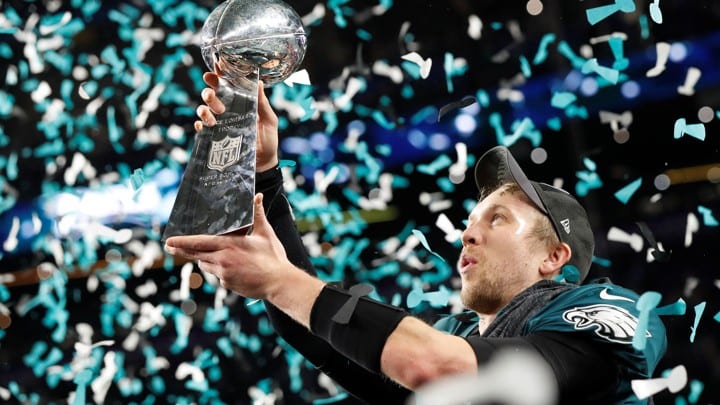Authors: Stefano Gamba (’21) and Avery Morris (McCormick ’22)
En lieu of the surprising Super Bowl win by the Philadelphia Eagles, we sought to explore whether or not a team winning a Super Bowl would significantly decrease the chances that a team improves over their record the year prior. We sought to do this by creating a statistical model consisting of NFL teams from the 2010-2018 seasons, and ran a regression on Stata in order to test the effects a Super Bowl win might have on a team’s win improvement over the year they won the Super Bowl.
In order to estimate this regression, we created a few variables, including the Improvement variable, which looks at the win improvement a team had over their previous season, the Super Bowl variable, a dummy variable equal to 1 when if a team won a Super Bowl the prior year, and a bunch of dummy year variables that are equal to 1 if they correspond to that given year.
Our regression is as follows:
Improvementit = β1SuperBowlit + d11Year11t + d12Year12t + d13Year13t + d14Year14t + d15Year15t + d16Year16t + d17Year17t + αi + uit
We ran an xtreg model because Improvement varies over entity (teams) and time (different years) and we are controlling for aggregate factors that change over time by including dummy year variables and controlling for entity fixed effects by including the alpha component. These controls allow us to truly see the effect a Super Bowl win may have over a team’s improvement. We estimated the following model:
Improvementit = -.2992652SuperBowlit + .009352Year11t -.021898Year12t + .009352Year13t + .009352Year14t + .040602Year15t -.053148Year16t + .071852Year17t -.4.77e^-18
From this model, we can test our hypothesis that Super Bowl hangovers are a real phenomenon by examining whether we have sufficient statistical evidence to conclude that our coefficient on our SuperBowl dummy variable is less than 0, which would indicate evidence of Super Bowl hangovers being a real factor in team win improvement. We should make our null hypothesis the idea that this coefficient is greater than or equal to 0, and our alternative hypothesis the idea that this coefficient is less than 0. By conducting a t-test at the 5% significance level, we find that our t-statistic is -.25, which yields a p-value of .804, indicating that we do not have sufficient statistical evidence to conclude that the Super Bowl coefficient is statistically different from zero. This indicates that over the last 8 years, using our data, teams have not deviated from the win totals a sufficient amount in order to conclude conclusively that Super Bowl Hangovers are necessarily an impediment on their win improvement totals.
In order to take a more informed approach on our question in the future, we should perhaps look at a bigger dataset, perhaps going as far back as the 2000s. We could control for the number of players a team has returning, and, perhaps, we should consider controlling for the New England Patriots, who were a big reason this data got skewed. In conclusion, however, we find that Super Bowl Hangovers have been overblown, especially when looking at more recent data. Perhaps this is because, as of late, teams who make the Super Bowl have become less and less randomized, as we see number 1 seeds making it the Super Bowl more and more often, as opposed to fluky wildcard teams like the Baltimore Ravens in 2012 or the Giants in 2007.

Be the first to comment on "Are Super Bowl Hangovers a Real Phenomenon?"